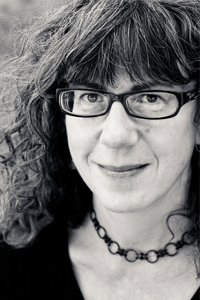Don't see what you're looking for?
Main Site
Berklee.eduCampuses and Schools

Paul and Kim Fake
Marti Epstein
For media inquiries, please contact Media Relations
Marti Epstein is a composer whose music has been performed by the San Francisco Symphony, the Radio Symphony Orchestra of Frankfurt, the Pro Arte Chamber Orchestra of Boston, Ensemble Modern, and members of the Boston Symphony. She has completed commissions for the Foxborough Musical Association, the Fromm Foundation, the Munich Biennale, the Iowa Brass Quintet, and the Callithumpian Consort, among many others. In 2005, she was the recipient of a Massachusetts Cultural Council grant. She has been a fellow at the Tanglewood Music Center in 1986 and 1988 and was in residence at the MacDowell Colony in 1998 and 1999.
Epstein is on the steering committee for the Boston Modern Orchestra Project Scoreboard and was composer in residence for the Radius Ensemble in 2009 and 2010. Her work has been recorded by cellist Rhonda Rider, and English horn soloist Robert Sheena and the Boston Conservatory Wind Ensemble under the direction of Eric Hewitt. Her string quartet, Hidden Flowers, was commissioned by the Tanglewood Music Center for the 2012 Festival of Contemporary Music. In November 2015, she released Hypnagogia, a CD of her chamber music. She teaches composition at Berklee College of Music and Boston Conservatory at Berklee.
- Composer with numerous international commissions
- Recordings include Albion Moonlight by Atlantic Brass, The Five Chairs by the University of Iowa Brass Quintet, and Waterbowls by Kathleen Supové
- Orchestral work "Celestial Navigation" premiered by the San Francisco Symphony, "Print" premiered by the Radio Sinfonie Orchestra of Frankfurt, and "Twylle" commissioned and premiered by the Pro Arte Chamber Orchestra
- Past residencies at the MacDowell Colony
- Recipient of Fromm Foundation 1998 commission
- Hypnagogia, a CD of her chamber works, recorded and performed by the Ludovico Ensemble
- B.M., University of Colorado
- M.Mus., Boston University
- D.M.A., Boston University
"There's a misconception about our department that because we teach the core courses, we're sort of old fashioned, and we're not. In some ways we're even more adventurous than people in some of the other departments."
"I would say that the composition students here are not composing jazz. Specifically, they're not composing commercial music. They're not composing jingles. They may be composing film music because we have a lot of dual majors. They're usually composing music that's artistically interesting and specifically for the concert hall."
"I think we do a better job of teaching concert music here than at other, more conventional music schools. Not only are the students here exposed to the whole classical canon, they're exposed to all different contemporary styles: jazz and all different kinds of pop styles and everything. So in a way they're getting a broader education."
"To graduate, students have to have a portfolio of pieces, and—very important—they have to have a certain number of these pieces performed because one of the aspects of a composer's training is, how do you get people to play your music?"
"The number one thing I do is to try to get students to hear everything they write. In my Techniques of Tonal Writing (CM-221) class, students are always writing for piano, and I spend a very substantial part of the class playing their pieces for them. Because I don't think you can compose in a vacuum. You have to be listening to what you're writing all the time. The feedback from me as a performer is invaluable because I can say, 'Well, this isn't playable in this situation because of this,' whereas if they're just sitting and sequencing what they're writing, they don't know what a human can and can't do."
"You have to develop really good writing skills before the technology will work for you in the way it's supposed to. And live performance, the human element, is so intangible but so necessary and so exciting."
Get More Information
By requesting information from Berklee, you will receive emails about our educational programs, student resources, facilities, and more based on your selections.
Thank you for requesting information.
Check your inbox for an email from Berklee. You will start to receive program information, updates, and deadline reminders.
Find the program that's right for you with Berklee's Find Your Program tool.
